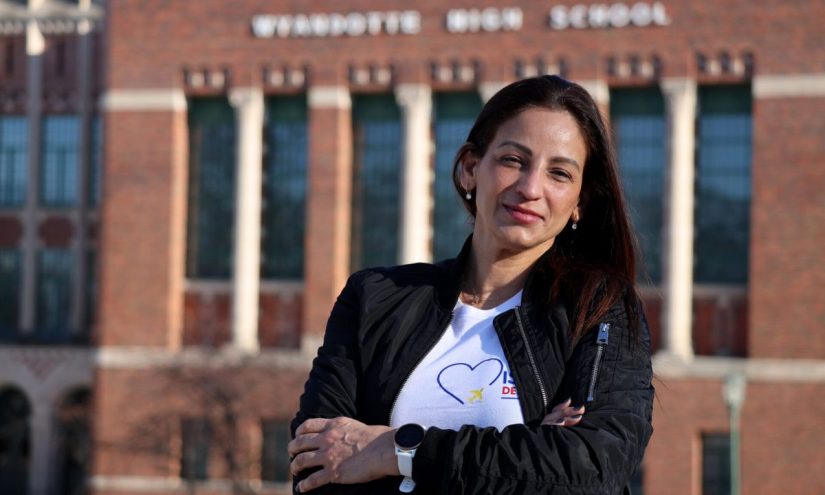Get stories like this delivered straight to your inbox. Sign up for The 74 Newsletter
Students began asking questions soon after President Donald Trump took office.
“How old do I have to be to adopt my siblings?” an area student asked a teacher, worried that their parents could be deported.
“Can I attend school virtually?” asked another student, reasoning that they would be safer from being targeted by immigration agents if they studied online at home.
A straight-A student from a South American country stunned and saddened her teacher by saying, “So when are they going to send me back?”
“Can I borrow a laminator?” asked another, who wanted to make a stack of “Know Your Rights” flyers sturdier. High schoolers have been passing the guides out, informing people what to do if stopped and questioned about immigration status.
Trump campaigned on a vow to deport millions of undocumented immigrants, boasting of mass deportations.
What that might mean for the children of targeted immigrants, or whether they would be rounded up, has been the subject of speculation, rumor and fear.
In early March, the Trump administration began detaining families at a Texas center, with the intention of deporting the children and adults together.
Kansas City area school districts are responding, training teachers and staff on protocols in case immigration agents try to enter a school and sending notices to parents.
“Not every school district, not every charter school, not every private school, has addressed the issue,” said Christy J. Moreno with Revolución Educativa, a Kansas City nonprofit advocating for Latinos’ educational success.
Parents in some local schools have had their fears calmed through district communication.
“There have been some districts that have been a little bit more public about their stance on this, but in general terms, they’re not being very public,” said Moreno, an advocacy and impact officer. “It’s because of all the executive orders and the fear that federal funding will be taken away.”
Indeed, when asked to comment, most area districts declined or pointed to district policy posted online.
Immigrant children’s right to attend public school, K-12, is constitutionally protected.
A 1982 U.S. Supreme Court decision, Plyler v. Doe, guarantees it regardless of immigration status.
The Plyler ruling also ensures that schools do not ask the immigration status of children as they enroll, something that area districts have emphasized in communication to parents.
The Shawnee Mission School District relies on policies that are the responsibility of building administrators if any external agency, such as law enforcement, requests access to or information about a student.
“We strongly believe that every child deserves free and unfettered access to a quality public education, regardless of immigration status,” said David A. Smith, chief communications officer, in a statement. “While we cannot control the actions of others, we can control how we respond.”
Schools were once understood to be off limits for U.S. Immigration and Customs Enforcement (ICE). Schools were considered to be “sensitive places,” along with hospitals and places of worship.
Trump rescinded that nearly 14-year-old policy by executive order immediately upon taking office in January.
In February, the Denver Public Schools sued the U.S. Department of Homeland Security, arguing that the schools’ duty to educate students was hindered by the change.
Students were missing school out of fear, the Colorado educators said. And administrators and teachers were forced to redirect resources to train staff on how to react in case immigration agents entered school grounds.
On March 7, a federal judge sided with Homeland Security in denying the injunction.
The ruling gleaned some clarity for schools, with the government noting that the current policy requires “some level of approval on when to conduct an action” in a school.
But that guardrail doesn’t negate anxieties, the judge acknowledged.
In the Kansas City area, one mother, with two children in public school, indicated that her district’s support was too hesitant.
“I know that the districts at this time have not come out in support of immigrant families in these difficult times,” she said. “They are just being very diplomatic, saying that education comes first.”
Plyler v. Doe: Constitutionally protected, but still threatened
Plyler v. Doe isn’t as universally understood as Brown v. Board of Education.
The U.S. Supreme Court case guaranteeing immigrant children’s right to a public K-12 education is a landmark decision, said Rebeca Shackleford, director of federal government relations for All4Ed, a national nonprofit advocating for educational equity.
“Kids are losing out already, even though they still have their right to this education,” Shackleford said. “There are kids who are not in school today because their parents are holding them back.”
The class-action case originated in Texas.
In 1975, the state legislature said school districts could deny enrollment to children who weren’t “legally admitted” into the U.S., withholding state funds for those children’s education.
Two years later, the Tyler district decided to charge $1,000 tuition to Mexican students who couldn’t meet the legally admitted requirement. James Plyler was the superintendent of the Tyler Independent School District.
The case was brought by the Mexican American Legal Defense and Educational Fund.
Lower courts ruled for the children and their parents, noting that the societal costs of not educating the children outweighed the state’s harm. The lower courts also ruled the state could not preempt federal immigration law.
Eventually the case was taken up by the U.S. Supreme Court, which in 1982 upheld the rights of the students to receive a K-12 education, 5-4, citing the 14th Amendment’s equal-protection clause.
“By denying these children a basic education,” the court said, “we deny them the ability to live within the structure of our civic institutions, and foreclose any realistic possibility that they will contribute in even the smallest way to the progress of our Nation.”
The court also said that holding children accountable for their parents’ actions “does not comport with fundamental conceptions of justice.”
There have been efforts by state legislatures to challenge the ruling.
In 2011, Alabama saw a dramatic drop in Latino student attendance, even among U.S.-born children, when the state ordered districts to determine the immigration status of students as they enrolled.
The law was later permanently blocked by a federal court.
Tennessee is currently debating passage of a law similar to the Texas law that led to the Plyler ruling.
The proposed law would allow districts to charge undocumented students tuition, and would require districts to check the legal status of students as they enrolled.
The bill recently passed out of an education committee.
The chilling effect of such proposals, like current calls for mass deportations, can be widespread for children, advocates said.
“How can you learn if you’re worried about whether or not your parents are going to be home when you get home from school?” Shackleford said.
Teachers nationwide are seeing the impact as students worry for themselves, their parents and friends.
“I think sometimes we forget that the words that we use as adults and the messages that we send are affecting our kids,” Shackleford, a former teacher, said. “And no one feels that more than teachers and classroom educators, because they’re right there in the rooms and hearing this and seeing the pain of their students.”
Information vacuums contribute to rumors
Voids in information leave room for misinformation, which is quickly spread by social media.
Local advocates for immigrant rights have been tamping down rumors about raids, especially in regard to schools.
There have not been any reported incidents involving ICE agents inside or on local K-12 school grounds.
But in February, a man was detained near a Kansas City school, presumably as he was getting ready to drop a child off for the day’s lessons.
Homeland Security officials arrested a man they said had previously been deported. Staff of the Guadalupe Centers Elementary & Pre-K School acted quickly, escorting the child into the building.
For districts, managing communications can be a balance.
North Kansas City Schools began getting questions from parents about ICE and Customs and Border Protection early this year.
On Jan. 24, the district sent a notice to parents emphasizing policies that had been in place for several years.
“In general, law enforcement has the same limited level of access to student records as members of the public with no special permissions,” according to the notice. “Law enforcement agents are not permitted to speak with nor interact with students without a valid subpoena, court order or explicit parent permission unless it’s an emergency situation.”
Kansas City Public Schools Superintendent Jennifer Collier addressed immigration in a late January board meeting.
Collier said that work had begun “behind the scenes” after Trump rescinded the sensitive-places policy.
“What we didn’t want to do was to get out front and begin to alarm everybody, to create anxiety,” Collier said, noting the “feelings of heaviness and in some cases feelings of hopelessness.”
All staff would be trained, including legal and security teams, in identifying valid court orders or warrants.
She emphasized the emotional well-being of students. And the district has posted guidance online.
“We’re going to make it to the other side of this,” Collier told her board. “So hold on. Don’t lose hope.”
This article first appeared on Beacon: Kansas City and is republished here under a Creative Commons Attribution-NoDerivatives 4.0 International License.
Get stories like these delivered straight to your inbox. Sign up for The 74 Newsletter


